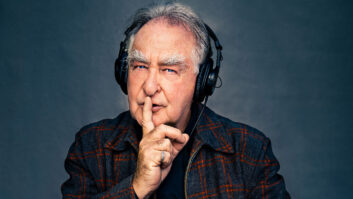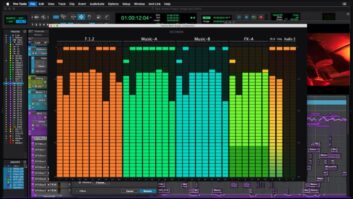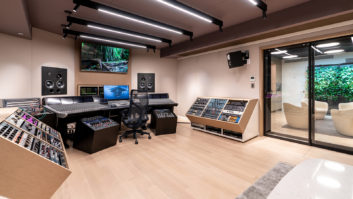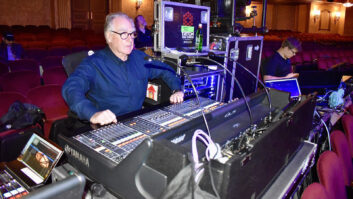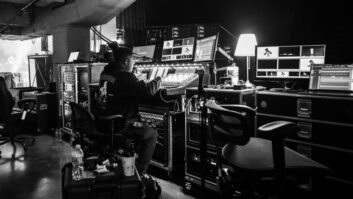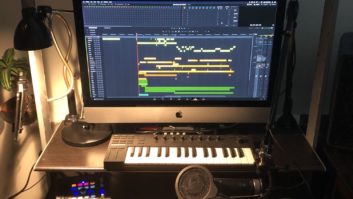Setting up an audio post facility with the right people, technology and amenities is critical in the highly competitive New York market. Targeting your client base is also key. All bets are off the board, however, when an unforeseeable firestorm like last year’s long and bitter Screen Actor’s Guild strike hits town. Suddenly, work dries up, and even the most senior players in the field are left scrambling for billable hours.
Did the strike (now a fading memory) change the face of audio post in New York? Did major studios realize that they were vulnerable in ways they’d not considered before and look for additional revenue streams? Did clients turn to non-union labor or talent outside the greater Metropolitan area? If so, did some of the audio post economy travel with them?
Understandably, not all of the post houses Mix contacted wanted to speak on the record about the long-term impact of the strike. However, we were able to gather a group of highly experienced — and visible — post personnel, including Howard Schwartz of HSR/NY, Gail Nord of SoundHound, Ralph Kelsey of Broadway Sound and Bob Pomann of Pomann Sound. Their comments about the strike, and the current state of the industry, should be illuminating to anyone interested in the health of audio post.
So, let’s begin with how the strike changed business, if at all, for your companies.
Howard Schwartz: It was a very interesting time, that’s for sure! My clients all hired non-union talent, and, as a result, it took twice as long to record stuff. From a billable hours point of view, business was mostly okay.
The bad news is that while the actors and actresses were on strike, a lot of people found out that there were other places to work than New York, and even the United States. They also found out that some of these other areas were less expensive to work in than New York. That newfound awareness has definitely changed the landscape of the production and post-production businesses in this area on a long-term basis.
Gail Nord: SoundHound was lucky to have a strong on-air promo client base that remained extremely busy during the strike. We used it as an opportunity to solidify and add to that client base, as well as add in long-format program mixing for some of our cable clients.
Bob Pomann: There was less of a cash flow! We found ourselves putting more effort into getting promo work clients, which was an area we hadn’t pursued vigorously prior to the strike. We were fortunate to have a steady cartoon series, Sheep In the Big City, on the Cartoon Network at the time. We hustled to get more series work, and that effort has paid off well.
Ralph Kelsey: The bulk of our business is cable promotion, so we didn’t really get a direct hit from the strike. However, since there was less business out there, we felt an indirect hit as a result of ad facilities trying to fill their studios.
Did you find yourself recording more music dates or delving into new media?
Pomann: We’ve got a composer on staff, but we didn’t go out looking to book our studio for music dates.
Kelsey: No, we didn’t get an increase in music dates. We didn’t actively pursue different business, although we did seem to get more long-form programming from our cable clients.
Nord: No increase in that area. We were fortunate in that the History Channel and A&E got more active in searching for this kind of business at the time of the strike. Having a strong client base was critical.
Schwartz: I didn’t change my business plan at all. We don’t do either of those two things — music sessions or new media work. Because of both the actors’ strike against television shows and the writers’ strike with Hollywood, both areas geared up and were pumping out a lot of work for a while, in anticipation of these stoppages. The consolidations of the post-production industry caused by Liberty Livewire created some new friends for us.
Things always are changing, and you have to be able to adjust. We have a great deal of capacity here, so when the advertising portion of our business went down, ADR went up. Last year’s Super Bowl was probably 75 percent filled with dotcom spots. This year, there was one. The industry created capacity to fill that need. Now it’s gone.
Did you have any construction plans that were put on hold as a result of the strike?
Nord: We were able to complete all our construction plans as scheduled, which included a complete remodeling of the common areas of the facility — including the lobby, client lounge, conference room, hallways and bathrooms.
Pomann: Yes. I was about to build a lounge when the strike hit, but I canceled plans. I’m now building a new studio, which should be completed by October of this year. We have five editors now, and we’re very impressed with an Australian company called DSP. They make a workstation, the DSP Poststation, that’s comparable to a Fairlight. It’s made specifically for audio post-production. We’re getting one full mix station to start. If it works out, we’ll get four more of them.
Kelsey: We actually increased our capacity 50 percent, fulfilling a contractual agreement we had made with our biggest cable client.
Schwartz: We never stopped any of our construction plans. HSR/NY has a continuing upgrade policy. Once we consolidated all of our business here at the Graybar Building, we instituted a philosophy of constantly re-evaluating and upgrading equipment throughout the 25,000 square feet of space that we occupy.
Let’s face it, though: The days when equipment drove the industry are gone. We now have a creative democracy, with tools available to everyone. The differentiations are based on talent and how people feel when they’re at your place. Do you have a restaurant that they want to come back to?
Has the strike had a long-term impact on the way your business is conducted?
Schwartz: No.
Kelsey: Our commitment still remains to our core clients, but because of our increased capacity, we’re now able to avail ourselves to other markets.
Pomann: Not really. We just thought positive throughout the whole process. We did believe that the strike would end more quickly than it did. I feel sorry for the people who struck, because they got very little out of it.
Nord: The strike really helped confirm our business philosophy of developing a diverse client base.
Has the commercial work come back to the level it was at in the pre-strike days?
Nord: Our commercial work has not returned to its pre-strike levels, although it seems to be picking up again in the last month or so.
Schwartz: No, and I don’t think that it ever will. With the consolidation of the advertising business, every agency laid off 24 percent of their staff. How many people lost money in the LBO craze? Or the dotcom madness? That money went into thin air, and some of it was used to support the advertising industry that drives a large piece of the production business.
As far as New York goes, two of the big shows done here ended their runs. Cosby went off the air, and Spin City went to California. We’re doing some new reality show work, plus lots of sports programming. We’re also doing more cable work than we used to do, and that’s okay. Our promo business is up for all of the networks. In general, things are okay, and okay is better than it could be.
Pomann: Yes, pretty much. We’re experiencing the usual summer slowdown, but that’s normal. The slowing of the economy also has an impact, but that’s also cyclical. We do a lot of high-end radio work, and the economy slowing down hasn’t affected that part of the industry as much as it has television. We do casting, music and basically everything you can do for a radio spot. Clients come here from as far away as Boston to put a package together. Smaller agencies working without a producer will often have us act as producer as well.
Kelsey: Advertising is such a small percentage of our business that it’s hard to say. It is actually one of the markets in which we plan to expand into.
Have you had to lay off any staff due to the impact of the strike?
Nord: Fortunately, we have not had to contemplate any staff layoffs, as our volume of work has remained consistently high.
Schwartz: Yes, we’ve done some house cleaning. Things were fat; now, it’s “may the best man win.” There have been a number of closures already, both audio and editorial companies.
Pomann: No, we kept the entire staff going.
